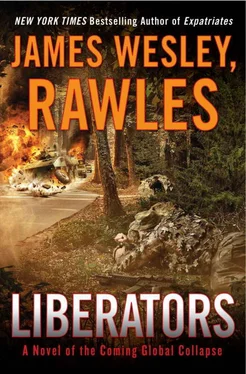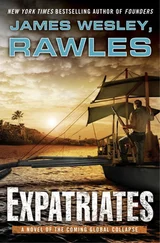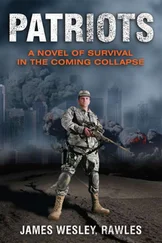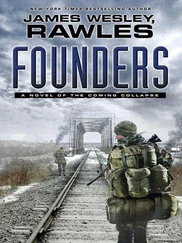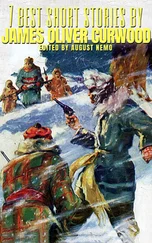They quickly climbed into cooler, more timbered country, which was how they had always imagined Idaho would be. It was 155 miles from Mountain Home to the former ski resort town of McCall. On the way, they passed through the derelict sawmill town of Cascade, which still had mountains of sawn logs.
On July 12, they made it to McCall and camped just one hundred yards from Payette Lake. There, they were surprised to witness a drunken contingent of Belgian troops partying by the lake, teaching themselves how to water ski. They were using a pair of stolen ski boats that they had brought back to life with UN-supplied 94-octane gasoline.
The next ninety miles, which brought them back onto Highway 95, en route to Grangeville, took them through some scenic mountainous ranching country and forest lands. On July 20, Joshua shot a young cow elk with his .270 rifle. They rested for the next four days, gorging themselves on elk steak and making as much jerky as they could carry.
Then they dropped down into arid country alongside the Little Salmon River. Except for the town of Riggins—which was the farthest northern point of UNPROFOR occupation—the population density was very light, and there was no sign of UN troops except for a couple of daytime convoys.
A local, who was a former whitewater rafting guide, warned them to avoid a UN roadblock that was at the north end of Riggins. He advised them of the route they should take, and drew them a tracing of a Forest Service map. They would have to turn off on Big Salmon Road and take a long detour. This squiggly route, which took them through abandoned Salmon Hot Springs and then up the mountainous gravel Salmon-Grangeville Road (on NF-263 and NF-2630), had not been maintained since before the Crunch. Because of landslides and downed timber, the road was just barely passable in spots with their game carts, and would have been impassable for anything else except perhaps dirt bikes. The detour took them two grueling nights and fifteen hundred feet of elevation change, but ironically it deposited them back on Highway 95, less than a mile north of Riggins.
They now could make better speed, but they still traveled only at night, for fear of bandits or being strafed by UNPROFOR helicopters, which had been seen as far north as White Bird.
On August 20 they passed through White Bird and started up a long, steep grade to the Camas Prairie, skirting around the town of Grangeville.
There were several buildings near Grangeville that were blackened ruins. They didn’t stay to ask if the buildings had been burned by looters or by a long-ranging UNPROFOR gunship. They just avoided getting close to the town and moved through the area as quickly as possible.
After transiting the Nez Perce Indian Reservation, they dropped down to the city of Lewiston. They ended up taking the dozens of switchbacks on the Old Lewiston Grade to avoid any vehicles on Highway 95. Once at the top of the grade, they entered into the rolling Palouse Hills country. Although mostly cleared and cultivated, the region offered lots of shady forested canyons, where they could lay up each day. Once up on the prairie, there was a maze of small farm roads that they could take toward Bovill.
By September 5 they were in the hamlet of Blaine. Finally, on September 9, they reached Bovill. There, a man with the local CB network contacted Todd Gray’s ranch. Ken Layton came to pick them up in Jeff Trasel’s pickup truck, towing a box trailer.
There were lots of hugs. The carts and backpacks were quickly loaded on the trailer. Riding with Ken in the cab of the pickup, Joshua and Megan sat with their rifles between their legs. Malorie sat in the bed of the pickup holding on to the boys. She was joyously singing them an old French Canadian sea shanty.
When they approached the lane from the county road that led to Todd Gray’s house, Ken said, “I love you like a brother, but I’ve got to warn you that things are crowded here. So crowded, in fact, that there’s already talk of splitting the group and putting half of us down at Kevin Lendel’s ranch, which is just a few miles down the road. Until that happens, things will be very cramped.
“Since UNPROFOR is already in southern Idaho and central Montana, we expect them to move in to northern Idaho next year, and things may get dicey. In fact, Todd made the mistake of speaking up and identifying himself publicly, when a UN spokesman came to give a speech at the Moscow-Pullman airport a few months ago. So when the Blue Helmets do arrive—and that could be as soon as this autumn—we may be at the top of their hit list. Todd and Mary are thinking that we may have to bug out. Now, don’t get me wrong, from a self-sufficiency standpoint, this is a great region to live in. I just don’t think that it’ll remain safe for you here at Todd’s ranch for very long.”
Joshua asked, “So what do you recommend, Ken?”
“I’ll make some inquiries, but I think that one of the big cattle ranches around St. Maries might be looking for a team like yours. You will, of course, have my strong recommendation, plus the letter of recommendation you’re carrying from that rancher you worked for near Driggs.”
Joshua sighed, and then said, “We’re going to have to pray about this and talk it over. We all have skills, and we want to help fight the ProvGov, but we have the safety of little Leo and Jean to consider.”
Ken said, “I’ll leave it up to you. Working at a ranch is probably the best option since you have your kids with you. But if you have enough precious metals to support yourself for a while, then maybe you’ll want to go and get involved with one of the militias that are forming. They’re popping up all over the region. I’m sure that they could use the help of folks with a background in intel gathering and analysis.”
They slept in the living room of Todd and Mary’s house just one night. They stayed up late, sharing stories of their adventures and testifying of God’s providence and protection. They caught up on events in different parts of the United States as they had played out during the Crunch and its aftermath.
The next morning, they awoke early. Joshua, Megan, and Malorie prayed together. Over breakfast, Joshua talked with Ken. Joshua said, “We reached a conclusion. We’ve decided that God has protected us thus far, so we need to continue to trust in him. So we think that we should get involved with one of the new resistance groups in the region. For the sake of the boys, we need to keep a fairly low profile. We’d like you to make the introductions, but please do so under our assumed names from the very beginning.”
Ken nodded, and said, “You got it, brother.”
Thou art my hiding place; thou shalt preserve me from trouble; thou shalt compass me about with songs of deliverance. Selah.
—Psalm 32:7 (KJV)
Moscow, Idaho—September, the Fourth Year
Joshua rented a house on Harden Road, on the northwest side of Moscow, just north of the University of Idaho campus. As a college town, Moscow had been depopulated following the Crunch, and only now was it getting back to its earlier population level. There were plenty of rental houses and apartments available. They also started attending Christ Church, which met nearby on Baker Street.
The Moscow Maquis already had eighteen members. With Ken Layton and Todd Gray vouching for their bona fides, Joshua, Megan, and Malorie were recruited to form a new cell within the organization—one that specialized in intelligence analysis. Their new cell and its location would be known only to the two key leaders of the Maquis, and they would be identified only by their first names during their interactions. For the sake of OPSEC, the Moscow Maquis leaders habitually referred to Joshua’s small cell as “the intelligence guys in Spokane.”
Читать дальше
